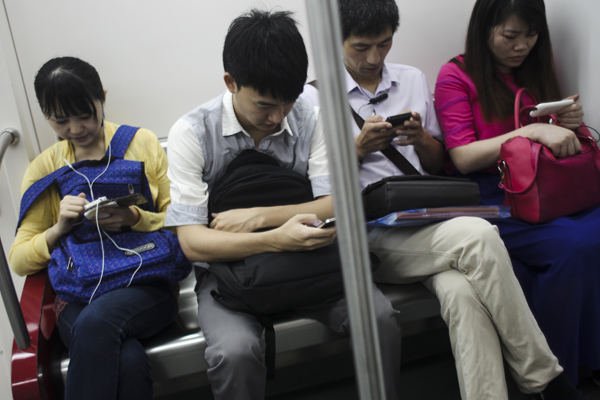When phone lines become lifelines
Updated: 2013-08-17 00:19
By SHEN JINGTING (China Daily)
|
||||||||
The loss of his smartphone was a big blow for Xia Nan. The 31-year-old high-tech company worker from Beijing said he left his iPhone device in a taxi, turning his world upside down.
To be specific, mobile applications, rather than the handset itself, are the things that Xia really relied upon. Before he purchased his smartphone two years ago, he had an old Nokia feature phone that did not have any applications.
 |
|
Smartphones, together with their internally installed mobile applications, have significantly changed the lifestyle of many Chinese people, according to a recent survey conducted by Beijing-based Horizon Research Group.Provided to China Daily |
The day after he lost his modern device he forgot to attend a meeting, because he had got used to relying on it as a private secretary to remind him of such things. When he took the subway, he became bored because he could not watch TV dramas or read electronic books as he used to do during the one-hour trip.
Xia's girlfriend called him on his land line to join her for dinner at a restaurant after work. After the call, he was frustrated because instead of turning to his mobile phone, he had to use his computer to check the route on a map.
"I suddenly realized the importance (of those mobile applications) when I had to live without them," Xia said.
Smartphones, together with their internally installed mobile applications, have significantly changed the lifestyle of many Chinese people, according to a recent survey conducted by Beijing-based Horizon Research Group. Horizon research carried out its survey of 1,973 urban Chinese citizens aged from 18 to 32 in April.
Three out every 10 respondents said they have more than 20 applications on their mobile phones, while 22 percent of them said they have between 11 and 20.
Users of Apple Inc's iOS platform tend to be most interested in downloading applications because the App Store offers diversified applications, covering categories such as gaming, education and books in large quantities.
More than half of iOS system users installed 20-plus applications, while about 30 percent of Android platform users and 27 percent of Windows Phone system users equipped their handsets with a similar number of applications, the survey discovered.
According to a report issued by Baidu Inc, the number of mobile applications in China was close to 500,000 by March 31. Application downloads introduced by mobile search engines increased by almost fivefold year-on-year during the first three months, the Baidu report revealed.
Applications that feature "funny", "unique" and "efficient" characteristics attract the most followers. About 40 percent of Horizon Research respondents said they would install an application if it was interesting and 42 percent of people treasured apps that possessed an efficiency-improving capability.
Books, music, social networking and gaming applications are the top categories that Chinese people want to download, it found. More than half of the respondents said they have book- and music-related apps on their mobile phones.
Most Viewed
Editor's Picks

|

|

|

|

|

|
Today's Top News
Debt crisis unlikely in short term: Think tank
Dozens die in Egyptian bloodbath
Watchdog won't block Abe's military changes
Xi vows medical support to Africa
China trims US Treasury holdings in June
Defense chief kicks off US visit
Error puts Shanghai bourse in a spin
Japanese leaders claim neutrality
US Weekly

|

|
















